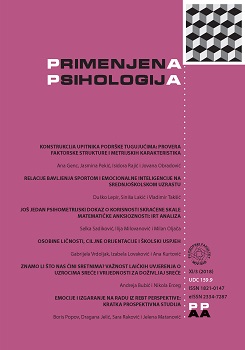EMOCIJE I IZGARANJE NA RADU IZ REBT PERSPEKTIVE: KRATKA PROSPEKTIVNA STUDIJA
EMOTIONS AND WORK BURNOUT FROM THE REBT PERSPECTIVE: A SHORT–TERM PROSPECTIVE STUDY
Author(s): Boris Popov, Dragana Jelić, Sara Raković, Jelena MatanovićSubject(s): Psychology
Published by: Филозофски факултет, Универзитет у Новом Саду
Keywords: dysfunctional negative emotions; functional negative emotions; positive emotions; REBT model of emotions; work burnout
Summary/Abstract: The main objective of the study was to test REBT model of emo-tion in prediction of burnout. It was hypothesized that dysfunc-tional negative emotions (DNE) would positively predict burnout, positive emotions (PE) would negatively predict buronut, while functional negative emotions (FNE) were hypothesized to be un-correlated to burnout. To test those assumptions, a short‒term, 12 week prospective study was carried out (three measurements, with the interval of 6 weeks). A sample of 197 employees took part in the first measurement (60.3% women); however, due to sample attrition, 113 (64.6% women) underwent all three meas-urements (Little’s MCAR test n.s., which indicates that the data were missing completely at random). Respondents completed the Work burnout scale from the Copenhagen Burnout Inventory, and the Inventory of functional and dysfunctional emotions. It has been shown that the reversed causal model displayed greater fit indices in comparison with the causal model, meaning that it is more likely that burnout will lead to subsequent emotions than vice‒versa. What is more interesting is that in fact burnout had a stronger (although very similar) impact on FNE than it did on DNE. However, when measured simultaneously, it appears that the experience of emotions has greater effect on burnout than vice‒versa. Moreover, in cross‒sectional analysis (at Time 3), FNE had a greater (although very similar) unique effect on burn-out than did DNE. In Time 2, only DNE exerted significant effect on burnout. Finally, PE largely did not predict burnout. The results were discussed in the context of REBT model of emotions. The limitations of the study were also highlighted and discussed.
Journal: Primenjena psihologija
- Issue Year: 11/2018
- Issue No: 3
- Page Range: 365-384
- Page Count: 20
- Language: English

